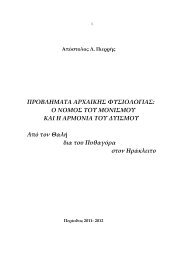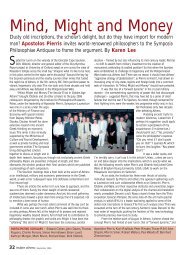APPENDIX C΄ ON DEPILATION: BODY COSMETICS IN CLASSICAL ...
APPENDIX C΄ ON DEPILATION: BODY COSMETICS IN CLASSICAL ...
APPENDIX C΄ ON DEPILATION: BODY COSMETICS IN CLASSICAL ...
You also want an ePaper? Increase the reach of your titles
YUMPU automatically turns print PDFs into web optimized ePapers that Google loves.
552 <strong>APPENDIX</strong> <strong>C΄</strong><br />
We conclude then that in classical times already the practice of<br />
removing the hair from a man’s fundament existed, common enough<br />
to be repeatedly satyrised, and associated with effeminacy and,<br />
specifically, with desire to undergo anal intercourse. I am insisting on<br />
this specific characterization because we can see, in this case too, how<br />
exactly the latter fits with the earlier in our sources. One of Ausonius’<br />
epigrams (CXXXI) is entitled: In quendam, qui laevia sibi inguina<br />
faciebat, and runs thus:<br />
Inguina quod calido laevas tibi dropace, causa est:<br />
irritant volvas levia membra lupas.<br />
Sed quod et elixo plantaria podice vellis<br />
et teris incusas pumice Clazomenas,<br />
causa latet: bimarem misi quod patientia morbum<br />
appetit: -et tergo foemina, pube vir es.<br />
It is very clearly and nicely put: depilation of a man s pudendum<br />
area implies proclivity to exercise energetically his membrum during<br />
copulation (for such hairlessness is an irritant); depilation of a man’s<br />
anal area means dominant desire to enjoy pathetically the activity of<br />
another’s membrum. We have met with half of this situation in<br />
classical times, we cannot doubt the existence of the rest. Although, of<br />
course, the depilation was not really carried out in halves; hairlessness<br />
in the significant areas of a man was a sign of particular devotion to<br />
sexual pleasures in general - but was satyrised under the aspect in<br />
which the person made fun of was makihy himself vulnerable, as well<br />
as from the viewpoint of the comic writer.<br />
We can multiply examples, if we wish. There would be no need for<br />
this exertion, but for the notion that used to, and still does, largely<br />
dominate the scholarly world of the last two centuries, according to<br />
which obscenity and immorality, as we would understand them, were,<br />
grosso modo, foreign to the classical period, and only to be found in<br />
the corrupt and perverted habits of the empire. This is a very<br />
obfuscatory and far from true conception. We should bravely<br />
appreciate, to put it concisely, that ancient morality was based on selfconscious<br />
natural excellences of proud natural essences, not on the<br />
dutiful, weak observance of a Law imposed from without (from<br />
above) on a weak and poor nature.










